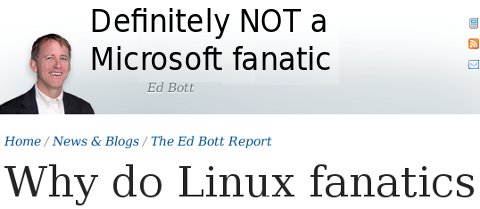08.13.12
Posted in GNU/Linux, Microsoft, Novell, OpenSUSE at 3:15 am by Dr. Roy Schestowitz

Summary: The Microsoft-funded SUSE will reportedly work with Microsoft to restrict the number of operating systems (or distributions) which can run on future hardware
BASED on some reports like this one, “Olaf Kirch of SUSE writes on the blog, “At the implementation layer, we intend to use the shim loader originally developed by Fedora – it’s a smart solution which avoids several nasty legal issues, and simplifies the certification/signing step considerably. This shim loader’s job is to load grub2 and verify it; this version of grub2 in turn will load kernels signed by a SUSE key only. We are currently considering to provide this functionality with SLE11 SP3 on fresh installations with UEFI Secure Boot present.””
“We are currently considering to provide this functionality with SLE11 SP3 on fresh installations with UEFI Secure Boot present.”
–Olaf KirchWe criticised Red Hat for what it did [1, 2, 3, 4, 5, 6, 7] about UEFI and now we shall criticise the Microsoft-funded SUSE as well. They just never learn, do they? Pamela Jones helps remind us of what Microsoft does to so-called ‘partners’. To quote: “Novell has followed through, as it said it would, and has filed a notice of appeal in its litigation against Microsoft over antitrust issues from WordPerfect.”
Why does Novell run back into the same cave that had it devoured in the past? And why did SUSE not stand up to Microsoft? Or even opted for the Canonical approach (which is the lesser of the two evils)? SUSE does not even like Unity all that much. It seems not to follow Canonical’s footsteps. SUSE’s business model is to use Microsoft to take away from Red Hat while passing Microsoft a share of its gains.
As reports flood the Web with support from SUSE folks Red Hat will surely use SUSE’s choice to defend its own bad policy. Matthew Garrett, for example, writes: “There’s a post here describing SUSE’s approach to implementing Secure Boot support. In summary, it’s pretty similar to the approach we’re taking in Fedora – a first stage shim loader is signed with a key in db, it loads a second stage bootloader (grub 2) that’s signed with a key that’s in shim, the second stage bootloader loads a signed kernel. The main difference between the approaches is the use of a separate key database in shim, whereas we are currently planning on using a built-in key and the contents of the firmware key database.”
“In summary, it’s pretty similar to the approach we’re taking in Fedora…”
–Matthew GarrettOpenSUSE has an anniversary, but coverage about the project is scarce. SUSE is planting some PR in Indian Web sites; that won’t change a thing. When you serve your competitor you lose credibility, especially when that competitor is a convicted monopolist. Debian has been on the good side in all this (supporting the FSF’s petition), but some minutes ago we learned that “GNU/Linux” is being removed from release names (scroll down to the list). █
“What we [Novell and Microsoft] agreed, which is true, is we’ll continue to try to grow Windows share at the expense of Linux. That’s kind of our job. But to the degree that people are going to deploy Linux, we want Suse Linux to have the highest percent share of that, because only a customer who has Suse Linux actually has paid properly for the use of intellectual property from Microsoft. And we took a quota, you could say, to help them sell so much Suse Linux. That’s part of the deal. We are willing to do the same deal with Red Hat and other Linux distributors, it’s not an exclusive thing. But after a few years of working on this problem, Novell actually saw the business opportunity, because there’s so many customers who say, ‘Hey look, we don’t want problems. We don’t want any intellectual property problem or anything else. There’s just a variety of workloads where we, today, feel like we want to run Linux. Please help us Microsoft and please work with the distributors to solve this problem, don’t come try to license this individually.’ So customer push drove us to where we got.”
–Steve Ballmer
Permalink
 Send this to a friend
Send this to a friend
08.07.12
Posted in GNU/Linux, Kernel, Microsoft, OpenSUSE at 5:00 pm by Dr. Roy Schestowitz
Shutting the gates on Linux

Summary: New criticism of the Linux-hostile hardware layer measure which claims to improve security whilst in fact offering almost none
THE talented journalist Sam Varghese, a man who likes to dive deep into issues, says that “Microsoft is apparently unwilling to discuss the reasons behind its move to a so-called secure boot process for Windows 8, the next release of its operating system.”
He backs this assertion and shows that UEFI might be good for nothing but impeding GNU/Linux adoption. Linus Torvalds claims it's no good for security.
As another up-to-date release of OpenSUSE is expected, we remain without answers from the Microsoft-funded SUSE as to how it plans to cope with UEFI. This is going to be interesting to watch. █
Permalink
 Send this to a friend
Send this to a friend
08.05.12
Posted in GNU/Linux, OpenSUSE at 4:32 am by Dr. Roy Schestowitz

Summary: The second RC of OpenSUSE 12.2 is out, but how many more releases are going to be made?
THERE are early signs that OpenSUSE will have a new release quite soon, with the second RC being out there in the wild.
After the latest deceitful PR from SUSE, aided by the Linux Foundation, we are saddened to see continued momentum (however small) for ‘Microsoft Linux’, so to speak. Some sites like Phoronix gave that coverage along with other SUSE sympathisers. To quote The H: “With the final version due in mid-September, the openSUSE developers have announced the second release candidate for version 12.2 of their Linux distribution. The two weeks since the first RC release have seen “a flurry” of last minute fixes in higher level packages as the core of 12.2 has been “stabilized and locked”. The focus now moves to final polish and fixes for release. One late change to the system has been the removal of many manuals and books from the DVD release of openSUSE to save space; a new “books” pattern can be installed separately for users who want them.”
Another SUSE sympathiser covered it but no large news sites. OpenSUSE does not matter so much anymore. █
Permalink
 Send this to a friend
Send this to a friend
08.02.12
Posted in OpenSUSE, SLES/SLED at 12:04 pm by Dr. Roy Schestowitz

Summary: New PR from SUSE seems dubious
SUSE, the Microsoft-funded and Microsoft-funding company that taxes GNU/Linux, has got some awkward new press release claiming leadership in Fog Computing. Someone from the Attachmate Group, promoting Microsoft tax through SUSE, accompanies the PR with this article:
But think of it this way: If you’re running a proprietary stack, you’re limited to the service providers that run on that single brand of infrastructure. If you need to mix and match, will your proprietary vendor be open to having the solution integrate with everything else? If you don’t have full support, then you’re opening up risks when the pieces don’t work together.
SUSE is sort of proprietary. It is hard to get SLE* source code, as we demonstrated several years ago. And also, it’s not free of charge. One must pay Microsoft. Here is an example of a writer who aided SUSE’s PR:
While much is written about the convergence of open source and cloud computing these days, including coverage of the trend here on OStatic, the usual players–OpenStack, CloudStack, Eucalyptus Systems, Red Hat–tend to dominate the headlines.
OpenSUSE blog posts have become quite rare, but here is one from hackweek:
The provisioning of a system is nothing new in SUSE Manager, so you might already be familiar with it. I stripped it down a bit, so the only option is to select the autoinstallation and to Create Cobbler System Record.
There are other improvements, but we no longer keep track of this project that openwashes SLE*. SUSE is gradually dying, but it is shameless with its PR. To claim leadership is to basically spin or lie. █
Permalink
 Send this to a friend
Send this to a friend
07.30.12
Posted in OpenSUSE, Red Hat, SLES/SLED at 3:48 am by Dr. Roy Schestowitz

Summary: Red Hat plants a flag in Germany when SUSE loses momentum and status
SUSE, the only Microsoft-approved brand of GNU/Linux (because Microsoft is paid for its use), has been bragging about German deployments, as we noted quite recently (SUSE/Microsoft tax polluting HPC). In Germany, however, large companies still use Red Hat too. Red Hat sought to make it clear with a press release:
German manufacturing firm updates IT systems with Red Hat Enterprise Virtualization
Red Hat Inc., provider of open source solutions, has announced that Ferrotec, a vendor of technologies based on the magnetic liquid Ferrofluid used in multi-phase motors, dampers for shaft ends and transformer cooling, has deployed Red Hat Enterprise Linux and Red Hat Enterprise Virtualization at the core of its infrastructure. Through this Red Hat technology combination, Ferrotec is increasing scalability, flexibility and performance while lowering operating costs.
Headquartered in Japan, the Ferrotec Group also has a large presence throughout Europe. In line with the company’s growth and additional business requirements, its IT infrastructure expanded with the purchase of new servers and an increase in memory capacity. As the company’s IT systems peaked, performance began to decrease, creating the need for a modern technology infrastructure to meet Ferrotec’s business demands.
For many in Germany, SUSE is sometimes perceived as supporting the Germans; in reality, SUSE is supporting Microsoft. It is time to shun SUSE even in Germany. OpenSUSE has lost its edge anyway, and to make matters worse, it became an extension of Microsoft. █
“Asked how small software companies could compete on products that Microsoft wants to fold into Windows, [Microsoft COO Bob] Herbold told Bloomberg News they could either fight a losing battle, sell out to Microsoft or a larger company or ‘not go into business to begin with.’”
–Newsweek, March 1998
Permalink
 Send this to a friend
Send this to a friend
07.15.12
Posted in GNU/Linux, OpenSUSE at 3:16 am by Dr. Roy Schestowitz

Summary: A quick look at SUSE at a time of crisis and face-saving RCs
THE NEWS about OpenSUSE reaching Release Candidate (RC) has travelled from the official site of OpenSUSE to SUSE-friendly outlets, a few exceptions, and sources that typically cover such SUSE news (owing to authors’ preferences). To quote: “Release Candidate for openSUSE 12.2 has just been released, taking one step closer to a stable release after the recent shake up”
“The project/product is facing real problems and the RC is no guarantee of technical quality.”To put things in context: “One month after openSUSE admitted it had a problem and was seeking a new direction, the first release candidate of openSUSE 12.2 is now available.”
There is also a response to Torvalds' rant about SUSE. To quote: “openSUSE team has announced the release of openSUSE 12.2 RC1 for testing. This release candidate gives us a glimpse of what openSUSE 12.2 will offer. There were some problems with Grub2 till the previous released, now it has been finally updated to Grub 2.0. The team has fixed the serial console support by respecting the console width. Its branding was also updated. There were fixes to udev, and to udisks and udisks2 to hide LVM RAID partitions, and many fixes came to autofs from an updated upstream patch.”
This hardly changes the fact that there are internal problems. The project/product is facing real problems and the RC is no guarantee of technical quality. There is no response to UEFI yet. █
Permalink
 Send this to a friend
Send this to a friend
06.29.12
Posted in GNU/Linux, Microsoft, OpenSUSE, Red Hat at 8:39 am by Dr. Roy Schestowitz
SUSE mascot now irrelevant to GNU/Linux

Summary: A couple of updates about the ‘open’ version of Microsoft Linux
DESPITE delays and other pressing issues, SUSE will manage to squeeze out another release of the “open” alter-ego of SUSE — that which is being used to openwash Microsoft Linux. Here are some of the expected inclusions:
openSuse 12.2 will be released soon,or atleast we can hope so. Here is a list of upcoming features supposed to be shipped by default with the next version of this operating system.
In the desktop environment front, openSuse will ship KDE 4.8 Plasma Desktop and Plasma Netbook, the latest stable versions of K Desktop Environment. It may also ship Plasma Active, the Plasma UI for tablets and mobile phones. KDE apps and frameworks have also been upgraded to version 4.8 and one can expect better performance and stability in KDE. Talks of shipping a new KDM theme and ksplash theme is on, and kspalsh will use the qml engine, the latest technology in KDE 4.8.
KDE 4,9 is already approaching its final release and those who are comparing Fedora to OpenSUSE can appreciate that Fedora 18 will be ahead (Fedora is also released more often). As for Fedora 17:
I ran fedora 17 for a while on my test machine. I have since replaced that with opensuse 12.2 Beta2. Before my memory fades, here’s a comparison of fedora 17 and opensuse 12.2. When installing fedora from the DVD image, I chose to install KDE, Gnome, LXDE and XFCE. Those are the same choices that I make with opensuse. Of course, I don’t really use all of those. Mostly, I use KDE and experiment with the others. On my test machine, I use XFCE because it is a little lighter in weight for the older slower hardware.
[...]
Fedora defaulted to using gdm as the desktop login manager. When I logged into XFCE, I found that there was no gpg-agent available. If I checked to option launch Gnome services on startup, I would then have a gpg-agent available. However, that also caused orca to run, which soaked up a lot of resources. As a result, KDE used less resources than XFCE.
I disabled the “launch Gnome services” so that orca would not start. In looking at running processes, it seemed that gpg-agent was actually running but there was no environment setting to make that available. I was able to put something into shell startup files to locate that agent and set the environment correctly. And, since the shell startup files are run at the beginning of the desktop session, that made gpg-agent available to the desktop.
With opensuse 12.1, I recall that I also had to have XFCE launch Gnome services to have gpg-agent and/or ssh-agent available. But at least that did not start orca in opensuse. I have not tested that with opensuse 12.2, where launching gnome services appears to be the default.
I have not used SUSE in 5 years. Back in the days it was a leading distribution. These days, there is nothing “leading” about it and it relies on funding from Microsoft. Debian GNU/Linux is one people can trust much more. Our trust in Red Hat is eroding not just because of UEFI [1, 2, 3, 4] but for other reasons we’ll mention in the next post. █
Permalink
 Send this to a friend
Send this to a friend
06.27.12
Posted in GNU/Linux, Microsoft, OpenSUSE, Red Hat, Ubuntu at 9:52 am by Dr. Roy Schestowitz

Context
Summary: Microsoft’s attack on booting freedom/openness has drawn different workarounds from different players; Microsoft continues bombarding the press with propaganda
THE UEFI debate has quieted down somewhat since the news from GNU/Linux distributors. The resultant controversy was enough for Microsoft to gain from, putting aside the effect on antitrust and GPLv3 (with software patents provisions), as we outlined quite recently. As The H put it, Canonical and Red Hat [1, 2, 3, 4] announced their plans and The Inquirer wrote:
Following Red Hat’s Fedora project announcing its plans to ensure that its Linux distribution will not fall afoul of Microsoft’s UEFI Secure Boot mechanism, Canonical has detailed how it plans on working with Microsoft’s ‘security feature’. The company will dispense with Grub 2, a Linux bootloader that it put significant work into, and modify Intel’s efilinux bootloader to add a menu interface.
Microsoft has managed to marginalise the GPLv3 using this devious scheme that helps security in no apparent way. As IDG noted, OpenSUSE, which is struggling internally, has not done anything yet:
Now that the Fedora Project and Canonical have proposed their own plans for their respective Fedora and Ubuntu distributions to work with the upcoming Secure Boot provisions in Windows 8-certified machines, it’s natural to wonder what openSUSE will be doing about the issue.
The answer for now seems to be unclear, and the reason may be one of openSUSE’s greatest strengths may be working against it.
Debian sidles with the FSF on UEFI protest and other distributions have said almost nothing on the subject. It was just the Linux Foundation, Canonical and Red Hat which said they would respond to it a few months ago.
Speaking of OpenSUSE, there are more delays as attendance or submissions might be slow to arrive:
New Deadline for openSUSE Summit papers to coincide with SUSECon’s Call for Papers, and more information about the Summit has been released
OpenSUSE is no longer a leading distribution, so we expect not so many people to get involved. SUSE and Microsoft are competing against free Linux and Red Hat, using Microsoft Linux (aka SUSE) as bait, taxing the competition as a whole and standardising this outrageous practice. Watch what Microsoft says about SUSE in the following new piece:
When we speak about partnering with the open source ecosystem, we mean to work a way forward. When we come to competing, we continue to compete with our open source competitors, says Mandar Naik, director, platform strategy, Microsoft India.
The piece if titled “Here Is Why Microsoft Is Warming Up To Open Source!” but it’s really about the Microsoft-funded SUSE and Microsoft Ganging Up Against (Gratis) Open Source. This fluff/puff piece is hard to read with a straight face, but the target audience is probably gullible people who could not care less about FOSS. It’s just a propaganda placement, portraying an abuser as a friend just like Bill Gates has been doing with a lot of puff pieces. As we shall show in the next post, Microsoft’s abuses are clear for some regulators to see. █
Permalink
 Send this to a friend
Send this to a friend
« Previous Page — « Previous entries « Previous Page · Next Page » Next entries » — Next Page »

























 Content is available under CC-BY-SA
Content is available under CC-BY-SA